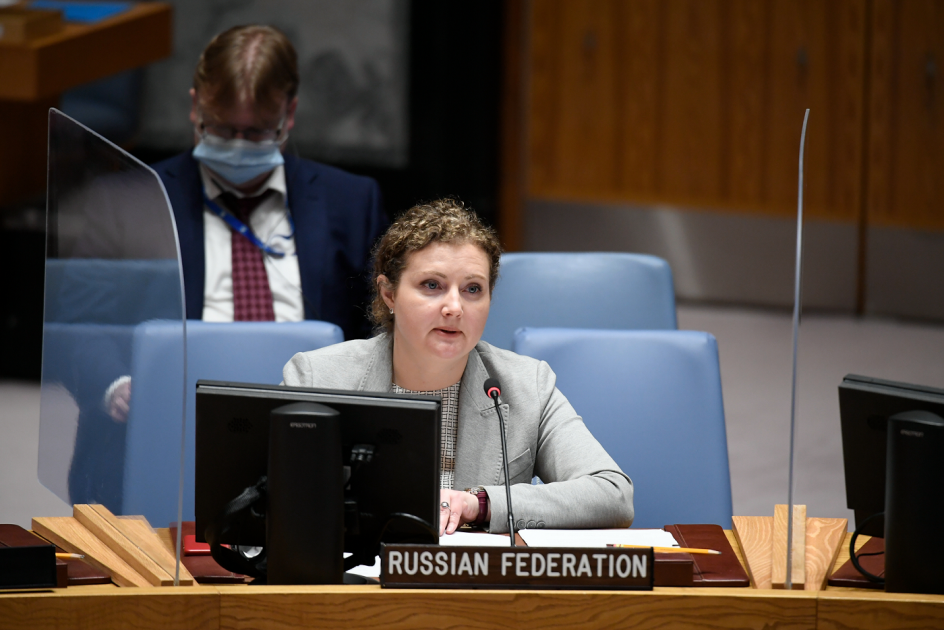Statement by Deputy Permanent Representative Anna Evstigneeva at UNSC briefing on Central Africa
Mr.President,
We thank Special Representative of the Secretary-General François Lonseny Fall for the assessments of the situation in the Central African subregion that he presented. Russia consistently supports the activity of the UN Office in Central Africa (UNOCA) as an important tool of preventive diplomacy. We believe that “good offices” of SRSG Fall are highly demanded, and therefore we support the recommendation of the Secretary-General to extend the mandate of this mission for another three years.
Mr.President,
The situation in Central Africa remains complicated. It is characterized by increased terrorist activity, political tension and unstopping conflicts. The coronavirus that exacerbated the already difficult socio-economic situation of the population still remains a threat for the region.
We are particularly concerned over the volatile security situation in Chad, where President I.Deby was killed on 20 April 2021. This tragic event will have far-reaching implications for peace and stability in the region and on the African continent at large. At the same time, we must not forget why the region is having such a precarious situation: it was caused by the intervention of Western states in the neighboring Libya back in 2011 and the protracted violent conflict that followed. The results of the 4th extraordinary Summit of the Lake Chad Basin Commission that President of Nigeria M.Buhari hosted in Abuja on 25 May 2021 prove our assessments.
We support the efforts of the African Union aimed at normalizing the situation in Chad, i.a. its articulated recommendations regarding national dialogue and reconciliation, as well as timely organization of democratic elections.
In general, the characteristic feature of that region is the so-called porous borders that allow for unimpeded movement of civilians and goods, but also of militants and smuggled items. Thus on 30 May an incident took place at the border between Chad and the Central African Republic. Militants from the ‘Coalition of Patriots for Change’ (which is in opposition to Bangui) carried out a provocation which triggered clashes between the Chadian and Central African military and claimed victims. Therefore we call on all sides to act in a reserved manner and solve all problems peacefully. We note the commitment of the CAR authorities to join efforts with Ndjamena to ensure border security. In order to prevent any misunderstanding in the future, Chad and the CAR need to create a joint commission for border demarcation. We are aware that Bangui has come forth with a corresponding initiative. We hope that Ndjamena will welcome this plan.
Mr. President ,
We regret to see that the area of activity of terrorist groups in Central Africa is expanding. “Boko Haram” and “Islamic State in West Africa” remain the major sources of instability in Cameroon, Nigeria, Niger, and Chad. Besides, jihadists do not abandon their plans to gain a foothold in the CAR.
We are afraid that uncontrolled jihadist propaganda that radicalizes the population, weakness of central authority at the periphery of some countries, socio-economic challenges, as well as easy access to small arms make the scenario of establishing "Caliphate v.2.0.” in Africa rather real.
Therefore states need to step up efforts in order to disclose and curb recharge channels that terrorists use to replenish ideological, technical, financial, and human resources.
A more active engagement of the toolkit of UNSC specialized subsidiary bodies, first of all the Counter-Terrorism Committee and 1267/1989/2253 Sanctions Committee on ISIL and ‘Al-Qaida’ would contribute to effective prevention and countering of terrorist threat on the African continent, including the threat coming from ‘Boko Haram’.
Mr. President,
The situation with safety of navigation in the Gulf of Guinea raises serious concern. The incidence of sea robbery of commercial vessels remains high. Besides, pirates quite often take crew members as hostages for ransom.
We commend the activity of the UNODC-sponsored Global Maritime Crime Programme. In 2020, the Russian Federation made a decision to allocate a special contribution to the budget of this program. These funds were used to render technical assistance to the coast guards of the Gulf of Guinea coastal states. We intend to continue providing financial support to the regional partners via UN channels.
Also, it would be viable to ensure a broader engagement of UN mechanisms designed to counter maritime piracy and sea crime. In our view, the expertise of the Contact Group on Piracy off the Coast of Somalia could be employed to solve similar problems in the Gulf of Guinea.
Mr. President,
I cannot fail to react to the statement made by our US colleague.
I can see nothing new or unexpected in this story. The US delegation throws at us just the same set of baseless allegations. Coupled with the campaign that has been launched in some Media, it constitutes a coordinated action aimed at besmirching our effective (i.a. as compared to what’s done by other bilateral partners) assistance to stabilization in the CAR. We proceed from the assumption that cases of suspected breach of the IHL are to be investigated by competent bodies of the CAR once they are provided with meaningful evidence and facts rather than baseless allegations and biased journalist pseudo-investigations. We believe that it is unacceptable to blackmail countries that find themselves in difficult situations, threatening to revoke bilateral assistance (including financial) for “improper behavior or cooperation with improper partners”. Such practice is broadly used by our colleagues who say they care about the well-being of ordinary people so much.
As for the coordination and interaction with MINUSCA, we will set it forth both here in New York, and on the ground.
Thank you.
